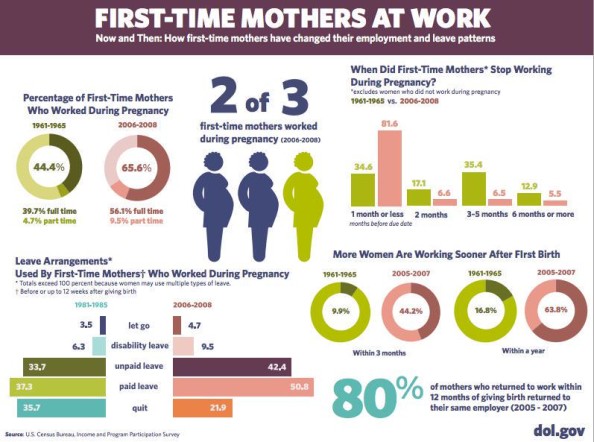By Ellen Bravo
Consider the tale of two sisters, both employed in similar jobs. One has a child in Wisconsin; the other gives birth several hundred miles away. The first sister gets no paid time off whatsoever. The other receives 50 weeks of paid leave at 55% pay.
 The second sister didn’t win the boss lottery. She lives in Canada, where employees participate in an Employment Insurance program that guarantees up to 50 weeks for a combination of maternity and parental leave (up to 35 weeks for a parent who does not give birth). The program is financed by small contributions from employers and employees — employers pay slightly more than half.
The second sister didn’t win the boss lottery. She lives in Canada, where employees participate in an Employment Insurance program that guarantees up to 50 weeks for a combination of maternity and parental leave (up to 35 weeks for a parent who does not give birth). The program is financed by small contributions from employers and employees — employers pay slightly more than half.
Imagine the difference in the well-being of the two women — one scrambling to return to work in a matter of weeks, having to cut short breast-feeding and search for expensive infant care. Her husband takes a few vacation days. The second sister breast-feeds for the entire year. Of the 50 weeks, her husband takes 10 and feels like a parent rather than a spare part. The new baby doesn’t trigger bankruptcy or debt.
The Canadian employers manage just fine. There’s been no exodus to the United States.
And let’s not forget the impact on the infants, who are more likely to have doctor visits and immunizations when parents have paid leave.
All our economic competitors, and nearly every poor nation as well, offers paid maternity leave. Seventy countries also guarantee paid time for dads, and many include time for sick family members. Only the United States and Papua New Guinea don’t guarantee paid leave.
Just 13% of American workers get paid leave from their employer, and less than 40% have temporary disability insurance through an employer for short-term illness. Each year, millions who are covered by the Family and Medical Leave Act need leave but don’t take it, or cut the time short, mostly because it’s unpaid.
States have been paving the way. A social insurance fund exists in California, New Jersey and Rhode Island. The leave is much shorter than Canada’s, and only employees pay premiums, but the weekly contribution is small. A growing body of evidence shows that the impact is great for families and positive or neutral for business.
Paid leave means Mary Ignatius in California could spend the time her baby needed for treatment of a birth defect. “It was such a relief,” Ignatius said. “I didn’t have to worry about anything but him.”
A poll by the Small Business Majority found most small business owners support such programs. The president’s budget includes $35 million for a state paid leave fund to help other states launch them. New York, Connecticut, Massachusetts and many others want to do just that.
U.S. Sen. Kirsten Gillebrand (D-N.Y.) and U.S. Rep. Rosa DeLauro (D-Conn.) are re-introducing a national fund known as the FAMILY Act. It would pool small shared contributions from employers and employees. For the average worker, the cost would be about $1.50 a week.
Opponents warn that the sky will fall and jobs will disappear. They said the same about every workplace reform, from bare-bone safety measures to ending child labor and establishing unpaid family leave. They were wrong then — and they’re wrong now.
 The opponents warn discrimination against women would flourish. But an Ad Council survey found 86% of men say they want to be more involved with their children. Even non-parents have parents, or partners, or may themselves wrestle with a serious illness.
The opponents warn discrimination against women would flourish. But an Ad Council survey found 86% of men say they want to be more involved with their children. Even non-parents have parents, or partners, or may themselves wrestle with a serious illness.
In places with paid leave, studies show dads get more involved, more seniors remain independent, more people get treatment they need.
And don’t forget the babies.
By attacking paid leave programs, our opponents are attacking the family values our nation cherishes and ignoring the resulting income our economy needs.
They’re also ignoring political reality. Paid family leave is enormously popular across the political spectrum. Voters say they’re more likely to vote for candidates who support such measures — and oppose those who don’t.
President Barack Obama is right — policies such as paid leave “shouldn’t be bonuses. They should be part of our bottom line.”
Broad and diverse coalitions across the country are campaigning for the FAMILY Act. Join them in making sure we can all be good parents to our children and good children to our parents without risking our financial security.
This is an updated version of an op ed that originally appeared in the Milwaukee Journal Sentinel June 28, 2014.